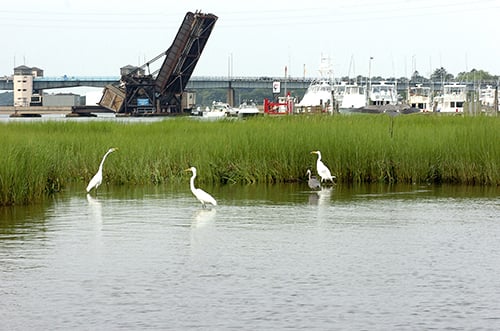ANNAPOLIS, Md. –The Mid-Atlantic Regional Council on the Ocean (MARCO), a partnership of five Mid-Atlantic states, has released a report on the role of Mid-Atlantic coastal wetlands in reducing climate risk. The report examines current practices for identifying and prioritizing wetlands for their ability to reduce climate risk and enhance climate resilience in the region. The report, prepared by the Environmental Law Institute (ELI), identifies opportunities for improving how coastal wetlands can serve as climate buffers in the coastal states of New York, New Jersey, Delaware, Maryland and Virginia.
Coastal wetlands can serve as an initial but important line of defense to protect coastal cities, towns and infrastructure from climate-related impacts by storage, conveyance, and wave attenuation. Coastal wetlands also help to stabilize shorelines, prevent erosion, and improve water quality by filtering, storing, and breaking down residential, agricultural and urban runoff.
The report, entitled “Developing Wetland Restoration Priorities for Climate Risk Reduction and Resilience in the MARCO Region,” proposes a framework for a regional approach to climate risk reduction and resilience. The framework includes three key areas related to the use and restoration of coastal wetlands in the Mid-Atlantic – policy, prioritization and data sharing and communication.
“The framework is meant as a starting point for collaboration across the region,” said Jim McElfish, senior attorney at the Environmental Law Institute (ELI). “The intent here is for states and their federal, local and nongovernmental partners to improve upon existing practices to identify objectives, set clear priorities in their resource management plans, and communicate visually with the public across the region.”
“The report identifies where, and to what extent, risk reduction and resilience goals are articulated and implemented in programs affecting wetlands in the MARCO states,” said Kaity Goldsmith, the project manager leading MARCO’s climate priority focus.
Based on an inventory and examination of climate adaptation plans, wetland management plans, and scientific tools, the proposed framework provides suggestions for:
- improving coastal resilience and risk reduction
- prioritizing wetland management and adaptation strategies
- encouraging adoption of successful methods across the region
The report identifies opportunities to coordinate and improve resource management strategies that protect coastal communities and maintain ecological function across the coastal states of the Mid-Atlantic region.
RESOURCES:
Link to report on MARCO website: https://www.midatlanticocean.org/wp-content/uploads/2017/01/Targeting-Conservation-and-Restoration-in-the-MARCO-Region-Final-Report-December-2016.Cover_.pdf
Link to ELI: https://www.eli.org

